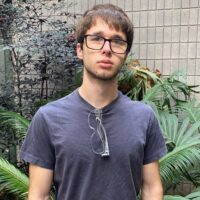
Standardizing Setaria viridis phenotyping protocols—Application to Rubisco overexpression lines
Earth’s population has grown tremendously over the last seven decades, from 2.6 to 7.6 billion1,2, and finding ways to provide food without increasing land use is essential. Improving crop photosynthesis is a promising pathway to sustainably feed the growing population. Previous studies have shown that overexpression of Rubisco in maize led to higher Rubisco content and increased yield3. In this study, we analyzed the effect of Rubisco overexpression (RAF1-LSSS) in another C4 species, Setaria viridis. S. viridis has many advantages as a model organism: it grows quickly, it is small, and uses C4 photosynthesis, just like foxtail millet, sorghum, maize, and sugarcane4. As S. viridis is a new model organism for the Stern lab, the first aim of this project was to establish a set of standards for measuring its growth and development. The second aim was to assess the effects of overexpressing Rubisco on the phenotype of S. viridis by recording daily and weekly measurements and monitoring the emergence of maturity features. Other measurements, like seed weight and biomass, will be taken later to determine how Rubisco affects yield. In the future, replicating the experiment with other events, using higher throughput phenotyping methods, and repeating in another controlled environment, like a greenhouse, would be useful to further elucidate the effects of overexpressing Rubisco in S. viridis.
My internship at BTI was a gentle introduction to research and the lab. I learned what the ‘mundane tasks’ of a researcher look like, and I also learned about the more exciting parts of research. Everything from daily measurements and lab notebook entries, to poster sessions at a symposium were part of the internship. In addition to learning about labs and research, I had the opportunity to talk to many researchers, everyone from my mentor, to the PI of my lab, and ask them questions I had about scientific research and graduate studies. I also had the opportunity to talk to undergraduate students from Canada, and learn all about the Canadian college system. BTI’s Wednesday seminars were also amazing opportunities. I was able to listen to experts in many fields, not just plant genetics, talk about their work, at a level that I could mostly understand.
